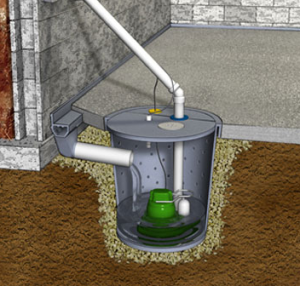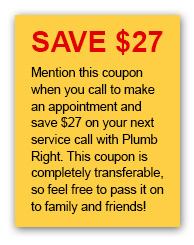|
Did you know that 5
out of 10 insurance claims are water disasters?
Billions of dollars of extensive water damage occurs
from internal flooding each year. A sump pump is your
first line of defense against water seepage. How old
is your unit? Are you willing to trust that it will
work properly when it needs to? If it fails, do you
have a battery backup system in place?
Prevent water issues, use our Spring Checklist
-
Check
to be sure your sump pump motor is still working. To
prevent backups, make sure any discharge lines are
clear and open.
-
Clear
leaves out of gutters and downspouts.
-
Check
around your homeís foundation for low spots that
would allow water to collect and run into your
basement. Add soil to those areas so water can slope
away.
-
Temporarily turn on the water to your outside
faucets and check for any leaks.
-
Make
sure that your basement shut off valves are not
leaking.
-
Check
the condition of your washing machine hoses. Flex
and bend the hose, if it feels extremely stiff or
you see any cracks then itís time to replace them.
We recommend the more reliable stainless steel
hoses.
What
is a Sump Pump?
 A
sump
pump is a pump used
to remove water that has accumulated in a water
collecting sump basin, commonly found in the basement
of homes. The water may enter via the perimeter drains
of a basement waterproofing system, funneling into the
basin or because of rain or natural ground water, if
the basement is below the water table level. A
sump
pump is a pump used
to remove water that has accumulated in a water
collecting sump basin, commonly found in the basement
of homes. The water may enter via the perimeter drains
of a basement waterproofing system, funneling into the
basin or because of rain or natural ground water, if
the basement is below the water table level.
Commonly found in the basement of homes, a sump pump
is used to remove water that has accumulated in a
water-collecting sump basin.
Water in basements is
a common problem
5
out of 10 insurance claims are water disasters.
Billions of dollars of extensive water damage occurs
from internal flooding each year. A sump pump is your
first line of defense against water seepage so you
want to make sure to be proactive with replacing an
old one or fixing one that has failed.
Why would I need a
sump pump?
 Homes
that need sump pumps have basements that flood
regularly. They are installed to correct the flooding
issue and to solve dampness where the water table is
above the foundation of a home. They are designed to
send water away from a house to an area where it is no
longer problematic such as a dry well or municipal
storm drain. Homes
that need sump pumps have basements that flood
regularly. They are installed to correct the flooding
issue and to solve dampness where the water table is
above the foundation of a home. They are designed to
send water away from a house to an area where it is no
longer problematic such as a dry well or municipal
storm drain.
Many pumps that were installed years ago still
discharge to the sanitary sewer system (for instance
through the drain in the laundry sink). Whereas this
was once acceptable, this practice now violates
plumbing code or municipal bylaws because this
discharge can overwhelm municipal sewage treatment
systems.
Battery backup is a
good idea
Since a sump basin may overflow if not constantly
pumped, a backup system is important because during a
severe storm where flooding is an issue, many times
the homeís electrical power can be out for a prolonged
period of time.
The submersible style is mounted completely inside the
sump and is specially sealed to prevent electrical
short circuits. These pumps are generally more
expensive to purchase, have a shorter lifespan (5-15
years) and are much less visible to the homeowner.
What other variables go into the decision to purchase
the right sump pump for my home?
When it comes to sump pumps, Plumb Right wrote the
book!
Over
and above the two basic types of sump pumps, there are
many variables to consider when purchasing/having a
sump pump installed which is why you should call the
professionals at Plumb Right.
-
Automatic vs. manual operation
-
Level
of horsepower needed
-
Head
pressure/maximum height that the pump will move
water
-
Power
cord length
-
Water
level sensing switch type
-
Backup system and alarm
 Donít
wait until your current system fails or the spring
rains flood your basement. Call Plumb Right for the
best advice, installation and service of new or
existing sump pumps. Donít
wait until your current system fails or the spring
rains flood your basement. Call Plumb Right for the
best advice, installation and service of new or
existing sump pumps.
Plumb Right provides dependable,
hardworking sump pumps and battery backup systems that
you can count on. Call us today at 763-561-3306 or
952-474-0302 for a consultation.
And if you ever get to the point
where your system has failed, call our emergency sump
pump line at 763-561-3306 for immediate help.

www.callplumbright.com
763-561-3306 or 952-474-0302
|